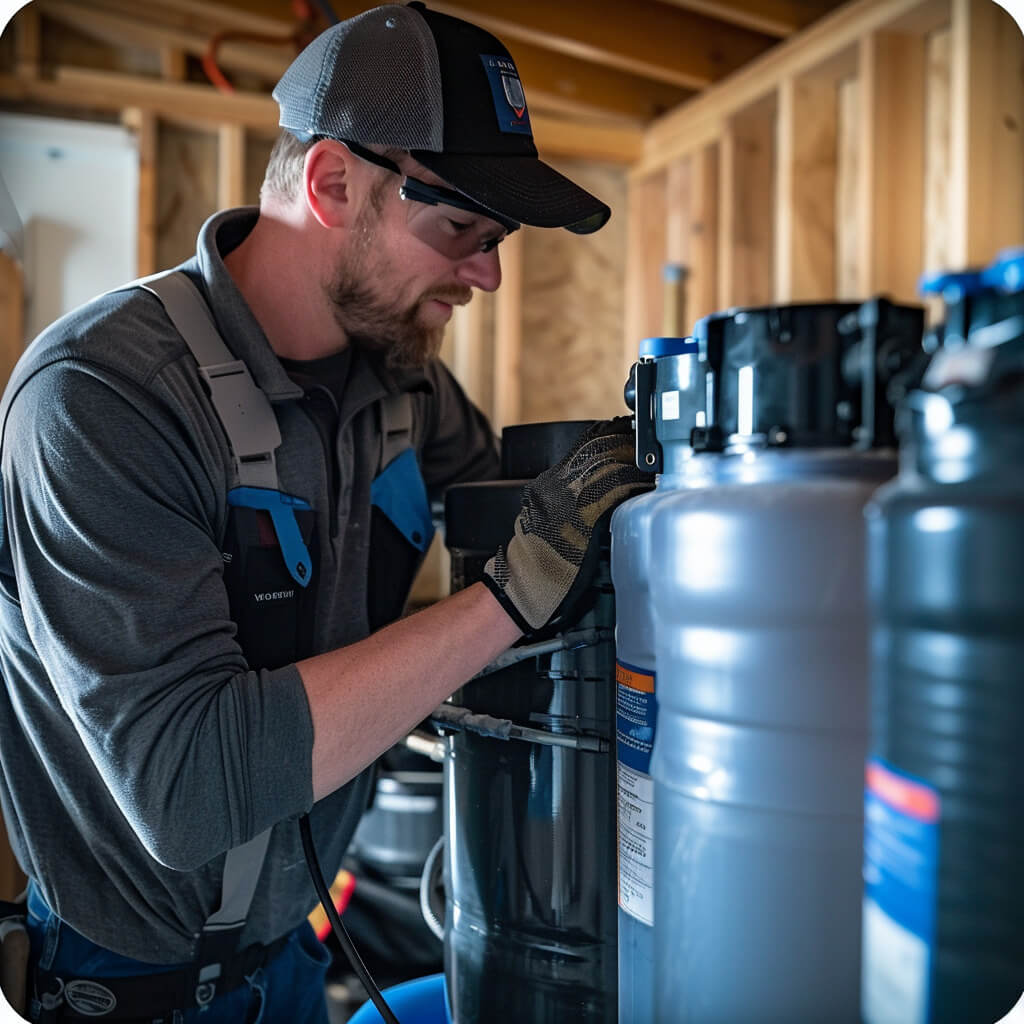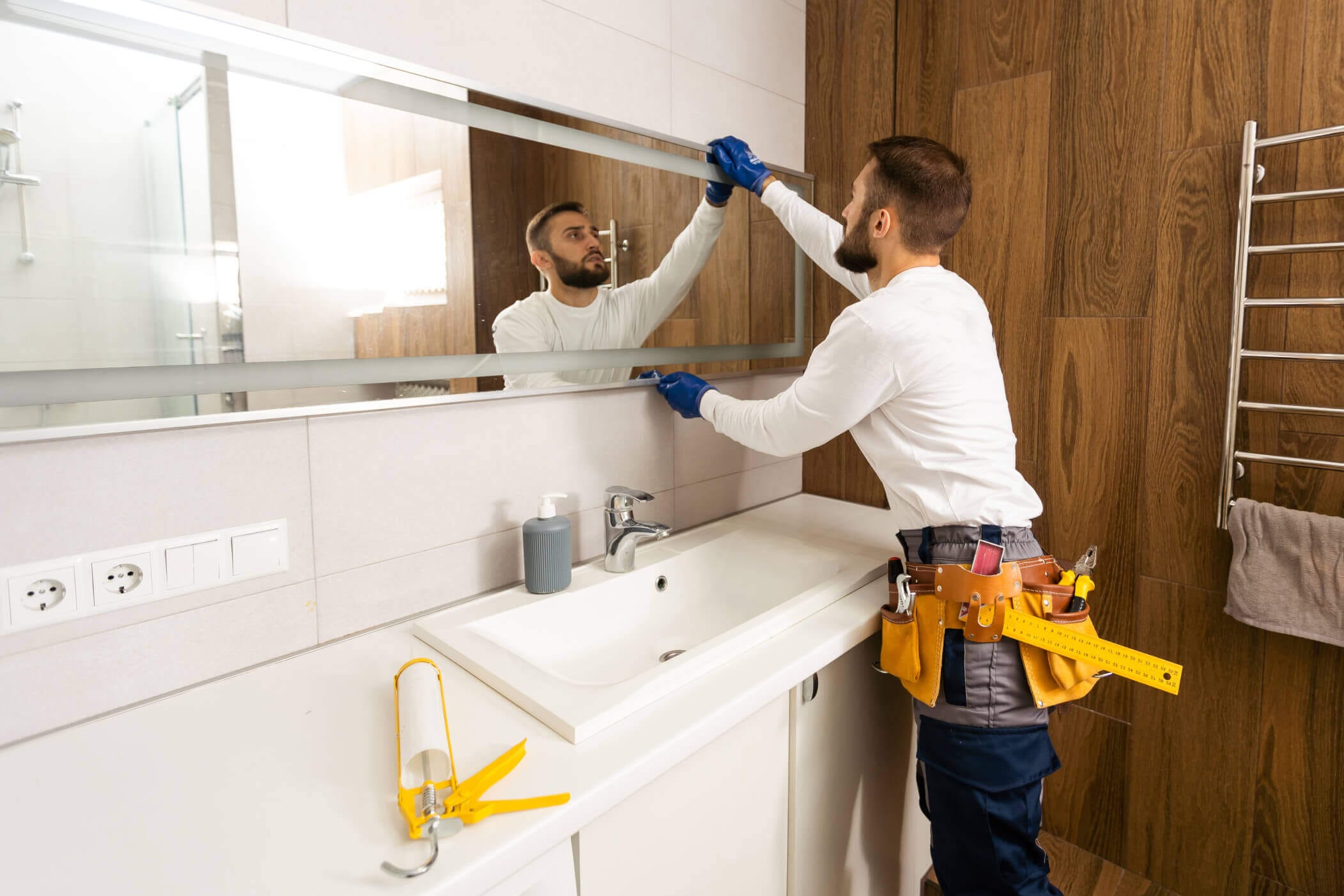What Is a Water Treatment System?
A water treatment system improves household water by removing or reducing specific issues such as hardness, chlorine, sediment, metals, or microbes. Solutions range from whole-house systems that treat every tap to point-of-use filters for drinking and cooking water.
Results you can expect:
- Better taste and odor
- Less scale buildup and longer appliance life
- Clearer, safer water for drinking, bathing, and cleaning
How Does a Water Treatment System Work?
Most systems combine steps so the right contaminants are addressed without overpaying for features you do not need.
Common processes:
- Sediment filtration removes sand, silt, and rust that cloud water and clog fixtures.
- Activated carbon reduces chlorine, many chemicals, and odors for better taste.
- Water softening (ion exchange) swaps calcium and magnesium for sodium or potassium to prevent scale.
- Reverse osmosis (RO) pushes water through a membrane to reduce dissolved solids and many metals.
- UV disinfection inactivates bacteria and viruses without chemicals.
- Distillation boils water to steam and recondenses it, leaving most impurities behind.

What Are the Different Types of Water Treatment Systems?
The main types of water treatment systems are whole-house filtration systems, water softeners, reverse osmosis systems, UV purification systems, and distillation systems.
Whole-House Filtration (Point-of-Entry)
Installed at the main line to treat all incoming water. Typically pairs sediment and carbon stages; can be combined with UV if biological contamination is a concern.
Water Softeners
Treat hard water to reduce scale, improve soap performance, and protect appliances. Salt-based ion exchange is most common; salt-free “conditioners” alter crystal formation but do not remove hardness minerals.
Reverse Osmosis (Point-of-Use or Whole-Home)
High reduction of dissolved solids and many contaminants. Most households use under-sink RO with a small storage tank; whole-home RO is specialized and costly.
UV Purification
Targets microorganisms. Often added after filtration to ensure biologically safe water without changing taste.
Distillation
Produces very low–mineral water; commonly used as a countertop unit for drinking and medical needs.
Other Point-of-Use Filters
Under-sink or faucet filters with sediment/carbon stages for taste, odor, and select contaminants. Shower filters reduce chlorine exposure at the tap.
Topics to Explore
Do I Need a Whole-House or Point-of-Use System?
Choose based on what you want to improve and where you experience problems.
- Choose whole-house if hardness is damaging plumbing or if chlorine/odor affects showers and laundry.
- Choose point-of-use if your main concern is drinking/cooking water quality at the kitchen sink.
- Combine when you need soft water throughout the home and polished drinking water at one faucet.
How Much Does a Water Treatment System Cost?
Costs vary by technology, capacity, and installation complexity. These ranges are for typical residential setups and include equipment; installation varies.
- Water Softener: $500 to $2,500 equipment; plus $200 to $500 installation
- Whole-House Filtration: $1,000 to $4,000; advanced multi-stage up to $6,000
- Under-Sink RO: $150 to $1,500; install $100 to $300
- Whole-Home RO: up to $10,000+ (specialized)
- UV System: $200 to $1,500; install $100 to $300
- Distillation: $100 countertop to $6,500 whole-home
How to Choose the Right System
Follow a simple, test-first process so you buy what you actually need.
- Test your water. Use a certified lab, a pro visit, or your municipal water report to identify hardness and contaminants.
- Map needs to technology.
- Hardness: softener
- Taste/odor/chlorine: carbon filtration
- Dissolved solids/metals: RO
- Microbes: UV
- Decide scope. Whole-house vs. under-sink, based on where issues show up.
- Check certifications. Look for WQA or NSF/ANSI standards for the contaminants you want removed.
- Plan maintenance. Filters, salt, RO membranes, UV lamps, and service visits add ongoing cost.
Maintenance Basics
All systems need routine attention to stay effective.
- Filter Changes: sediment/carbon every 3 to 12 months depending on use and water quality.
- Softener Upkeep: keep salt in the brine tank; clean the brine tank annually.
- RO Care: pre-/post-filters every 6 to 12 months; membrane every 2 to 5 years.
- UV Care: replace lamp annually; clean the quartz sleeve.
- Annual Checkup: consider a pro inspection for whole-house systems.
Working With a Water Treatment Company
What to look for when choosing a water treatment company:
- Detailed water test and written recommendations
- Itemized quote (equipment, install, permits, maintenance)
- Proper licensing/insurance
- Recognized certifications (WQA, NSF/ANSI)
- Clear warranties and service plans
Avoid: high-pressure sales, vague quotes, oversized systems that do not match test results.
Frequently Asked Questions
Ready to get your project started?
Let us find the best water-treatment pros in your area, then easily request quotes, book a contractor, and get the job done. It's that easy.

Homeowner Resources
Here are the top articles that homeowners found useful when planning their water-treatment project and navigating the contractor hiring process.

Real Stories, Real Success
See how our solutions empower homeowner projects and experiences.
